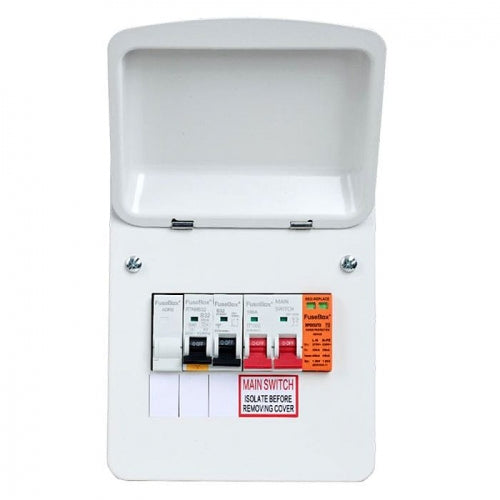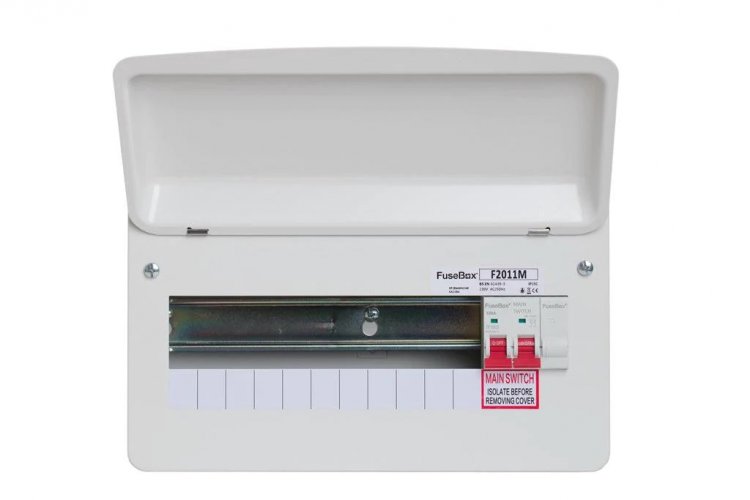A Comprehensive Guide to Preserving Your RCBO CONSUMER UNITS Effectively
The Duty of Customer Units in Reliable Energy Administration Systems
Consumer systems are indispensable to effective energy management systems, offering as the key circulation factors for electric power within frameworks. The development of wise innovations has actually additionally enhanced their performance, enabling for real-time data monitoring and nuanced energy usage analysis.
Comprehending Customer Systems

Understanding the function of consumer systems begins with acknowledging their important feature in safeguarding electrical systems. By isolating faults within specific circuits, customer units protect against widespread blackouts and potential fire threats. This seclusion is achieved through using breaker that journey or merges that strike when a fault is detected, thus removing the electric circulation to the affected circuit.
Additionally, consumer systems help with the well organized distribution of power, enhancing the performance of energy use. They permit the systematic monitoring of electrical tons, which can be particularly important in commercial and industrial settings where demand can change significantly. Properly conserved consumer devices add to the long life of electrical systems and aid in lessening downtime triggered by electrical failings, ultimately sustaining the seamless operation of energy-dependent facilities.
Smart Technologies Integration
-1796-p.jpg?v=293b7e83-9afe-44ed-b26f-caca2c71d6f2)
A crucial advantage of wise customer systems is their capability to take advantage of advanced formulas and equipment learning for anticipating analytics. This permits preemptive modifications based upon usage patterns, weather report, and other variables, considerably raising total efficiency. Wise customer units assist in demand response programs, where energy use can be dynamically adjusted during optimal periods to support the grid and reduce expenses.
The assimilation of renewable energy sources, such as solar and wind, is likewise structured via smart consumer systems. By wisely taking care of the intermittency of these resources, these devices ensure a trustworthy and well balanced power supply. In addition, clever customer devices boost customer involvement by providing detailed insights and push-button control capacities via mobile applications, cultivating an extra aggressive approach to energy conservation and sustainability.
Monitoring Energy Consumption
Building on the capabilities of smart innovations assimilation, keeping an eye on energy consumption ends up being a crucial emphasis within power management systems. Effective surveillance works as the foundation for recognizing power inadequacies and carrying out restorative measures. By leveraging innovative metering framework (AMI), real-time information on energy usage can be gathered at granular levels, giving useful understandings into usage patterns and peak demand periods. This data-centric go to this site technique allows both customers and energy supervisors to make enlightened decisions targeted at lowering waste and enhancing overall efficiency.
Smart meters and Web of Points (IoT) gadgets play a critical duty in this surveillance procedure. These devices can track energy usage in real-time, sending information to central systems for analysis. The gathered information is then refined via advanced algorithms to spot abnormalities, anticipate future intake, and suggest optimization strategies. Additionally, cloud-based options provide scalable systems for saving and analyzing big datasets, facilitating remote tracking and control.
The combination of these modern technologies not only empowers customers with thorough information about their power usage but also sustains utility companies in managing tons distribution better. Inevitably, specific and continual tracking is indispensable for achieving energy efficiency, price savings, and sustainability goals within power management systems.
Optimizing Appliance Use

One effective technique includes determining top and off-peak hours to move energy-intensive activities, such as washing or dishwashing, to times when energy demand is lower. This not just minimizes strain on the grid however additionally takes advantage of lower energy tariffs. Additionally, incorporating device knowing algorithms permits predictive maintenance, guaranteeing home appliances operate at optimum performance and prolonging their life-span.
Power monitoring systems can also include user-specific choices and behaviors to customize device usage timetables. For instance, clever illumination systems can readjust brightness based upon tenancy and natural light accessibility, while a/c systems can keep convenience levels without extreme power use.
Encouraging Sustainability
Promoting sustainability within energy management systems entails not just improving performance but likewise fostering environmentally responsible techniques. Customer units are integral to this process, as they offer real-time information and control mechanisms that allow customers to keep track of and lower their power intake. By leveraging advanced innovations, customer units can identify energy-saving possibilities and help with the combination of eco-friendly energy sources like solar and wind power.
One essential aspect of promoting sustainability is informing visit customers on the advantages of responsible energy usage. Via thorough insights supplied by customer units, customers can make enlightened decisions that lessen their carbon impact. As an example, these units can recommend optimal times for operating high-energy home appliances based upon grid demand and renewable resource schedule, thus decreasing dependence on fossil fuels.
Additionally, consumer units support the adoption of wise grid innovations, which boost the overall efficiency and dependability basics of power circulation. By making it possible for two-way communication in between consumers and utility carriers, these systems can dynamically get used to power demands, reducing waste and promoting making use of sustainable energy techniques.
Final Thought
Customer systems, as essential elements of power monitoring systems, considerably boost electrical security and efficiency within buildings through circuit security and smart modern technology integration. Furthermore, the unification of renewable power resources advertises lasting practices, contributing to decreased total energy consumption and lower carbon footprints.
Advancements in wise modern technologies have actually transformed the capacities of power administration systems, specifically via the integration of smart consumer systems.Building on the capacities of smart innovations combination, keeping track of energy usage ends up being a critical focus within energy management systems.Efficient device use optimization is a critical component of energy administration systems, intending to enhance performance and decrease unnecessary energy consumption.Customer devices, as integral components of power management systems, substantially boost electric safety and performance within structures with circuit security and wise innovation integration. Additionally, the incorporation of eco-friendly power resources advertises sustainable methods, adding to reduced overall power consumption and lower carbon impacts.